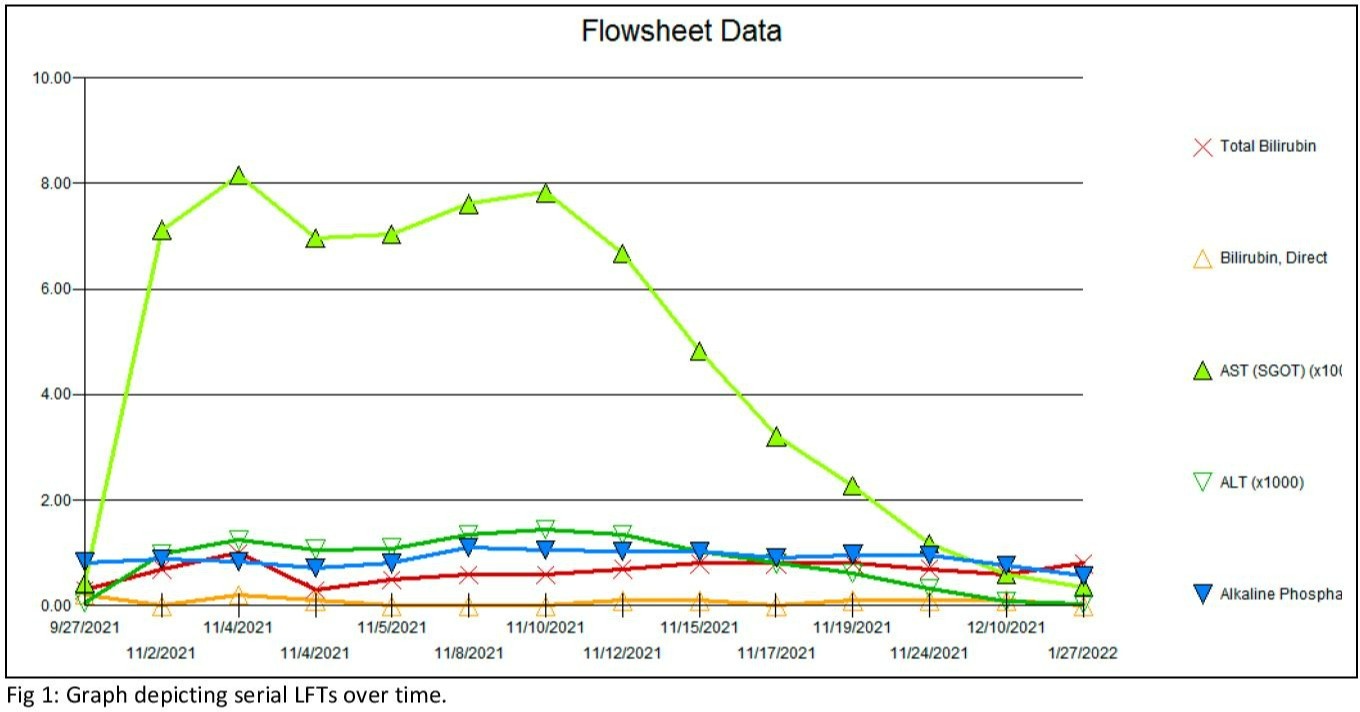Back
Poster Session A - Sunday Afternoon
A0538 - Hepatotoxicity From Marijuana Gummies
Sunday, October 23, 2022
5:00 PM – 7:00 PM ET
Location: Crown Ballroom

Khushboo V. Bhatia, MBBS
Mount Auburn Hospital
Cambridge, MA
Presenting Author(s)
Khushboo V. Bhatia, MBBS, Lipisha Agarwal, MBBS, Ruma Rajbhandari, MD, MPH
Mount Auburn Hospital, Cambridge, MA
Introduction: We report a case of drug-induced liver injury (DILI) induced by cannabis gummies containing Corydalis Rhizome.
Case Description/Methods: A 37-year-old female presented to her primary care clinic with recurrent fevers, night sweats, and myalgias for 7 weeks accompanied by eye redness, brain fog, headache, nausea, and abdominal pain. She denied rashes, tick-bites, cough, dyspnea, chest pain, joint swelling, or genitourinary symptoms. Past medical history was notable for IBS, migraines, and anxiety. She reported edible marijuana use four times a week, rare alcohol use, and denied tobacco use. She denied a family history of liver disease.
Physical exam was notable for tachycardia to 110 and scleral injection with the remainder of vitals and exam unremarkable. Initial labs were notable for AST 61, ALT 44 and CRP of 12. CBC, BMP, urinalysis, ESR, blood cultures, blood smear for parasite screen, tests for Lyme disease, Babesia, Tularemia, Anaplasma, Ehrlichia, Rickettsia, EBV, HIV, RPR, ANA, CMV, parvovirus B19, and chest x-ray were all negative.
The patient was referred to infectious disease with further testing for West Nile, Leptospira, lymphocytic choriomeningitis virus, and COVID-19 returning negative. Repeat LFTs showed worsening transaminitis with ALT 979 and AST 712, alkaline phosphatase 88, total bilirubin 0.7, and albumin 4.9. Hepatitis workup including hepatitis A, B, and C, HSV, EBV, VZV serologies, AMA, ASMA, antiLKM Ab, acetaminophen level, INR, iron panel, CPK, TSH, and abdominal ultrasound were all normal. It was later discovered that her marijuana gummies contained Corydalis rhizome extract known to be hepatotoxic. Cessation of this drug was strongly advised. She was discharged with hepatology follow-up and underwent a liver biopsy showing patchy periportal and lobular inflammation with extension across the limiting plate, hepatocyte injury and apoptosis, and increased lipofuscin for age compatible with mild to moderate hepatitis. She had complete recovery after cessation of Corydalis-containing gummies.
Discussion: Our patient consumed ‘1906 Midnight’, an American cannabis brand containing Corydalis rhizopus 100 mg, advertised to improve sleep, pain, and have a liver protective effect. A Korean systematic review on herbal-induced liver injury reported that Corydalis was the 3rd most frequent causative herb, with 36 cases. Although there are several personal accounts on social networking sites and other websites, there are no American-based publications reported on DILI from Corydalis.

Disclosures:
Khushboo V. Bhatia, MBBS, Lipisha Agarwal, MBBS, Ruma Rajbhandari, MD, MPH. A0538 - Hepatotoxicity From Marijuana Gummies, ACG 2022 Annual Scientific Meeting Abstracts. Charlotte, NC: American College of Gastroenterology.
Mount Auburn Hospital, Cambridge, MA
Introduction: We report a case of drug-induced liver injury (DILI) induced by cannabis gummies containing Corydalis Rhizome.
Case Description/Methods: A 37-year-old female presented to her primary care clinic with recurrent fevers, night sweats, and myalgias for 7 weeks accompanied by eye redness, brain fog, headache, nausea, and abdominal pain. She denied rashes, tick-bites, cough, dyspnea, chest pain, joint swelling, or genitourinary symptoms. Past medical history was notable for IBS, migraines, and anxiety. She reported edible marijuana use four times a week, rare alcohol use, and denied tobacco use. She denied a family history of liver disease.
Physical exam was notable for tachycardia to 110 and scleral injection with the remainder of vitals and exam unremarkable. Initial labs were notable for AST 61, ALT 44 and CRP of 12. CBC, BMP, urinalysis, ESR, blood cultures, blood smear for parasite screen, tests for Lyme disease, Babesia, Tularemia, Anaplasma, Ehrlichia, Rickettsia, EBV, HIV, RPR, ANA, CMV, parvovirus B19, and chest x-ray were all negative.
The patient was referred to infectious disease with further testing for West Nile, Leptospira, lymphocytic choriomeningitis virus, and COVID-19 returning negative. Repeat LFTs showed worsening transaminitis with ALT 979 and AST 712, alkaline phosphatase 88, total bilirubin 0.7, and albumin 4.9. Hepatitis workup including hepatitis A, B, and C, HSV, EBV, VZV serologies, AMA, ASMA, antiLKM Ab, acetaminophen level, INR, iron panel, CPK, TSH, and abdominal ultrasound were all normal. It was later discovered that her marijuana gummies contained Corydalis rhizome extract known to be hepatotoxic. Cessation of this drug was strongly advised. She was discharged with hepatology follow-up and underwent a liver biopsy showing patchy periportal and lobular inflammation with extension across the limiting plate, hepatocyte injury and apoptosis, and increased lipofuscin for age compatible with mild to moderate hepatitis. She had complete recovery after cessation of Corydalis-containing gummies.
Discussion: Our patient consumed ‘1906 Midnight’, an American cannabis brand containing Corydalis rhizopus 100 mg, advertised to improve sleep, pain, and have a liver protective effect. A Korean systematic review on herbal-induced liver injury reported that Corydalis was the 3rd most frequent causative herb, with 36 cases. Although there are several personal accounts on social networking sites and other websites, there are no American-based publications reported on DILI from Corydalis.

Figure: Fig 1: Patient's serial LFTs depicted over time.
Disclosures:
Khushboo Bhatia indicated no relevant financial relationships.
Lipisha Agarwal indicated no relevant financial relationships.
Ruma Rajbhandari indicated no relevant financial relationships.
Khushboo V. Bhatia, MBBS, Lipisha Agarwal, MBBS, Ruma Rajbhandari, MD, MPH. A0538 - Hepatotoxicity From Marijuana Gummies, ACG 2022 Annual Scientific Meeting Abstracts. Charlotte, NC: American College of Gastroenterology.
